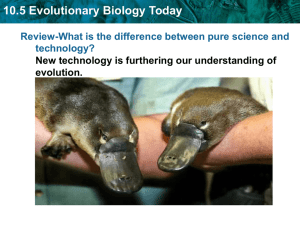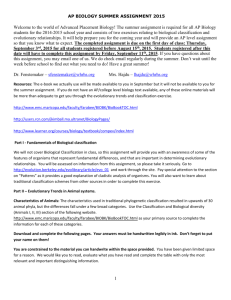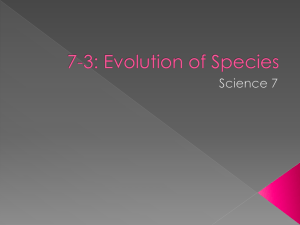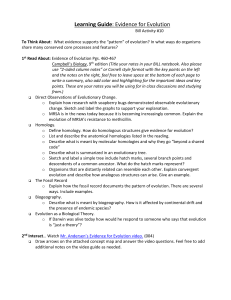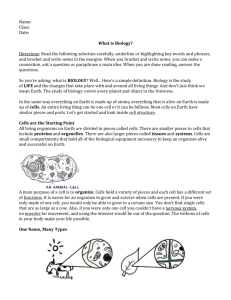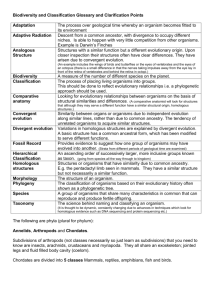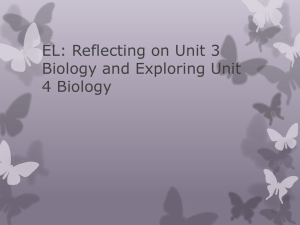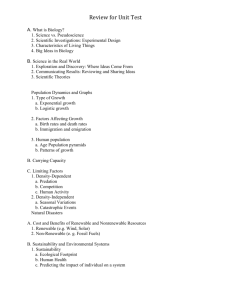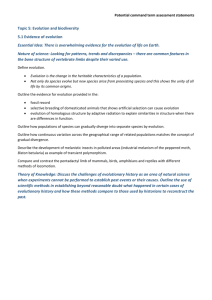Evolution and Ecology - University of Makeni
advertisement
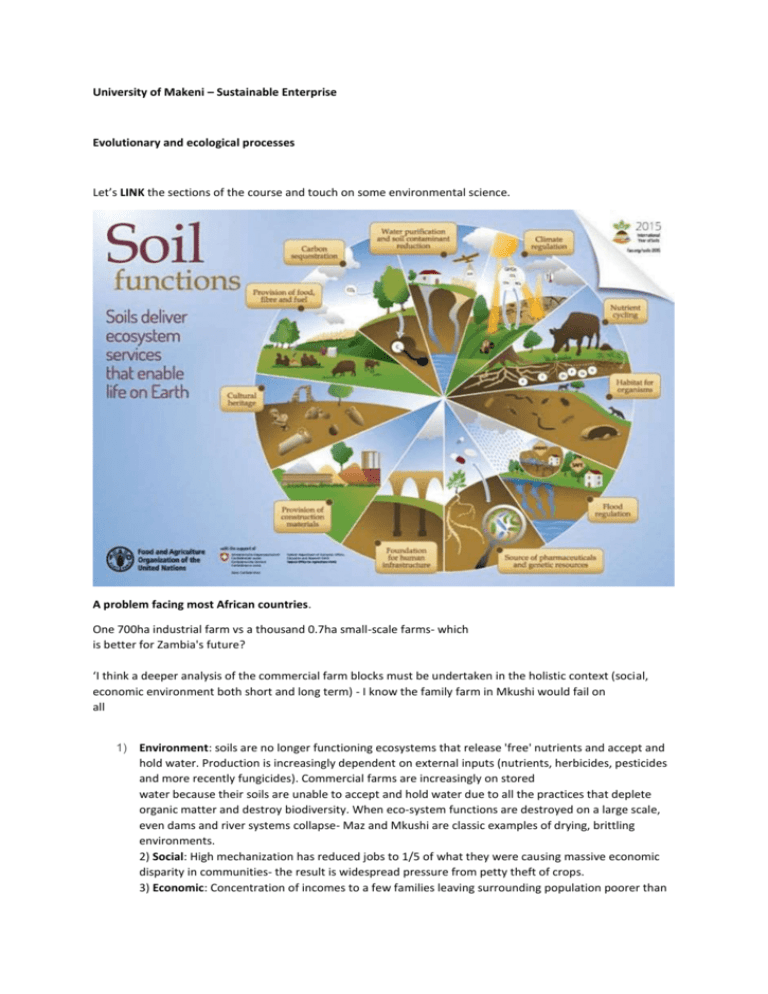
University of Makeni – Sustainable Enterprise Evolutionary and ecological processes Let’s LINK the sections of the course and touch on some environmental science. A problem facing most African countries. One 700ha industrial farm vs a thousand 0.7ha small-scale farms- which is better for Zambia's future? ‘I think a deeper analysis of the commercial farm blocks must be undertaken in the holistic context (social, economic environment both short and long term) - I know the family farm in Mkushi would fail on all 1) Environment: soils are no longer functioning ecosystems that release 'free' nutrients and accept and hold water. Production is increasingly dependent on external inputs (nutrients, herbicides, pesticides and more recently fungicides). Commercial farms are increasingly on stored water because their soils are unable to accept and hold water due to all the practices that deplete organic matter and destroy biodiversity. When eco-system functions are destroyed on a large scale, even dams and river systems collapse- Maz and Mkushi are classic examples of drying, brittling environments. 2) Social: High mechanization has reduced jobs to 1/5 of what they were causing massive economic disparity in communities- the result is widespread pressure from petty theft of crops. 3) Economic: Concentration of incomes to a few families leaving surrounding population poorer than when these blocks started. Profitability is declining along with social and environment in short and long term. The outlook: Increasing input costs will eventually render large scale farms un-viable. The global consensus that small-scale farming offers a more hope for a viable future is logical and correct- it will be far easier and more efficient for the 4 billion smallscale farmers on the planet to adopt regenerative technologies to address climate smart profitably. CSA = Climate Smart Agriculture http://unctad.org/en/pages/PublicationWebflyer.aspx… http://unctad.org/en/pages/PublicationWebflyer.aspx?publicationid=666 The above is set in Zambia but it applies to Sierra Leone. Most farmers are small-scale yet essential to the economic and social fabric of the country. Near to Makeni you have Addax and the development of ethanol – that is good news, as it bring employment, investment and ultimately sustainable ways of maintaining efficient modes of transport and electricity. We need to consider a blend and ways of encouraging small-scale farmers to use land more productively and widen their crop range. Careless use of land costs precious resources, employment and reduces the ability of a country to feed its people. Evolution as a process is composed of two parts: 1. An organism reproducing mechanism that provides variable organisms. Changes to any organism are largely random and effect future generations. They are made without regard to consequences to the organism. 2. A changing environment which screens organism changes. The environment provides stress on the variable organisms that selectively allows, through competition, certain changes to become dominant and certain others to be eliminated, without consideration for the future of the mechanism. That same process provides mechanism (organism) disintegration if a strong screening environment is not present. Evolution is a two-way process which does not always work to the long term advantage of the organism and in fact often becomes quite deadly to a given species and thereby eradicates it. The evolutionary process is bidirectional in its effect. It may, depending on the environment, either improve a given characteristic or decay it. The first step in the process is considered to be largely random and most organisms are quite complex, almost all of the variations are harmful. A characteristic of a species advances if the environment is harsh, since most harmful variations to that characteristic will be eliminated through death and suffering at a rapid rate, leaving only the inconsequential and helpful changes in the lineage. If the environment is benign with respect to the capability of the species then the harmful changes are not eliminated and the species will degenerate to a point of balance with the environment . This needs just a few moments thought. Darwin did not know of genes, so does that reduce the impact of his work? Are we more interested in ‘kin groups’, where we protect the continuance of those closest to us? Or are we motivated by replication? If I do something for one person will they ultimately do something for me. If so, why do we assist people who we will never see and who will never have the income to assist us? A never ending puzzle but one worth discussing. As evolution became more discussed, mostly in European countries, so Charles Darwin was shown as: It symbolises a link between less sophisticated primates and Homo sapiens. This area of study can give rise to some distinct differences in people’s ideas, these are normally based on belief systems. Within your group of students opinions will difference. This is not the time or place to discuss beliefs in detail, so let’s look at the basics of evolutionary biology and accept that in a social science such as Sustainable Development we are more concerned about adaption to our responsibilities to the environment we inherit and how these affect our use of finite resources. Natural Selection - the cultural differences that exist within us as groups of individuals can lead to differential survival of individuals – patterns within this selective process depend on the transmission biases and can result in behavior that is more adaptive to a given environment. So, those who lived many years ago in what is known as Sierra Leone adapted to their environment – for example skin colour and warm temperatures. Random Variation - this arises from errors in the learning, display or recall of cultural information, it is thought to be one of the ways that we evolve, as none of us know exactly what our characteristics will be and how they will evolve. Cultural Drift - In cultural drift, the frequency of cultural traits in a population may be subject to random fluctuations due to chance variations in which traits are observed and transmitted. In many developing countries citizens have to accept traditional rules, leaders etc. and also comply with changes imposed by a central government. It was Darwin who first suggested that human cultures undergo a similar evolutionary process as genetic evolution. Donald T. Campbell published some of the first theoretical work that adapted principles of evolutionary theory to the evolution of cultures and in 1976 - Richard Dawkins's The Selfish Gene introduced ideas of cultural evolution to a popular audience. Let’s move on from what is a rather complex topic and not directly related to a course focused on Sustainable Enterprise. If any of you are interested in looking in more detail at this area of ‘science’, then here is a brief reading list. Some are available in extract form on the Inter Net. 1. 2. 3. 4. 5. 6. 7. 8. 9. Boyd, R. and P. J. Richerson. 1985. Culture and the Evolutionary Process. Chicago: University of Chicago Press. pp.9, 69 P.J.B. Slater, V.M. Janik. Vocal Learning. In "Encyclopedia of Animal Behavior", 2010, Pages 551-557. http://www.sciencedirect.com/science/referenceworks/9780080453378 Gabora, L. (1995). Meme and variations: A computer model of cultural evolution. In (L. Nadel & D. Stein, Eds.) 1993 Lectures in Complex Systems, Addison-Wesley, 471-486. Feldman, M. and L. Cavalli-Sforza. 1976. Cultural and biological evolutionary processes, selection for a trait under complex transmission. Theoretical Population Biology 9: 238-259. Feldman, M and L. Cavalli-Sfornza. 1977. The evolution of continuous variation: II, complex transmission and assortive mating. Theoretical Population Biology 11:161-181. Boyd, R., and P. Richerson. 1985. Culture and the Evolutionary Process. Chicago: The University of Chicago Press. Henrich, J.; McElreath, R. (2003). "The Evolution of Cultural Evolution" (PDF). Evolutionary Anthropology (12): 123–135. Henrich, J. and R. McElreath. 2007. Dual inheritance theory: the evolution of human cultural capacities and cultural evolution. Oxford Handbook of Evolutionary Psychology, R. Dunbar and L. Barrett, eds., Ch. 38. Oxford: Oxford University Press. Henrich, J. and R. McElreath. 2003. The evolution of cultural evolution. Evolutionary Anthropology 12:123-135. The fundamentals of ecology. A branch of biology dealing with the relations and interactions between organisms and their environment, including other organisms. Ecology is a branch of biology focusing its attention on s living organisms. Organisms can be studied at many different levels, from proteins and nucleic acids (in biochemistry and molecular biology), to cells (in cellular biology), to individuals (in botany, zoology, and other similar disciplines), and finally at the level of populations, communities, and ecosystems – what is referred as a biosphere. It is a multidisciplinary science as it focuses on the higher levels of the ways of organising life on earth and on their interrelations with other organisms and the environment. Consider the ways an ecologist might approach studying the life of bees. Einstein thought that Homo sapiens would cease to exist within four or five years of the death of the final bee. Whether one subscribes to this idea or not, the role of bees in supporting the life patterns of human beings is crucial and a growing number of agriculturalists as suggesting that the cultivation of bees should be promoted right across the developing world. We can accurately predict what will be the outcome of affecting one part of an eco-system – what we do know is the evolution has developed complex systems of inter-related dependencies and the removal of one can have serious repercussions elsewhere. Some References These are organisations working to simplify food production, increase land yields without over use of chemicals, build food security, reduce rural-urban drift and improve the nutrition intake of everyone. http://grassrootstrust.com/ - promoting and holistic form of permaculture. Savory Institute - 1708 Walnut Street, Boulder, CO 80302 contact@savoryinstitute.org, T.303.327.9760 TED Talk http://www.ted.com/talks/allan_savory_how_to_green_the_world_s_deserts_and_reverse_climate_change?l anguage=en https://www.youtube.com/watch?v=E9DpptI4QGY – Farmer Managed Natural Regeneration (FMNR) Evolution You Tube http://www.bing.com/videos/search?q=youtube+-+evolution&qpvt=You+TUbe+-+evolution&FORM=VDRE Ecology http://www.bing.com/videos/search?q=youtube%20-%20ecology&qs=n&form=QBVR&pq=youtube%20%20ecology&sc=0-15&sp=-1&sk= The above contains some simple introductions to Eco-Systems.
